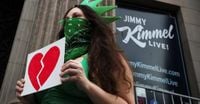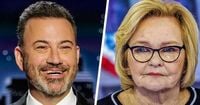On Wednesday, September 18, 2025, ABC made the bombshell announcement that it was suspending "Jimmy Kimmel Live!" indefinitely, following controversial comments by the late-night host on the recent killing of conservative activist Charlie Kirk. The network’s decision, made under mounting pressure from the Federal Communications Commission (FCC) and amid a storm of political outrage, has ignited a fierce national debate over free speech, government influence, and the future of late-night television in America.
The controversy began on Monday, September 15, when Jimmy Kimmel addressed Kirk’s death in his opening monologue. Kirk, a well-known conservative figure credited by some with helping President Donald Trump win the White House, was fatally shot on a college campus in Utah just days earlier. Kimmel’s monologue took direct aim at Trump’s supporters, referring to the accused shooter as “one of the MAGA gang.” He also mocked President Trump’s public response to the tragedy, quipping, “This is not how an adult grieves the murder of someone he called a friend; this is how a 4-year-old mourns a goldfish.”
Almost immediately, the remarks drew sharp criticism from conservative commentators and social media personalities. According to The New York Times, the backlash quickly spread on X (formerly Twitter), with high-profile figures like Elon Musk denouncing Kimmel’s comments as “disgusting.” Fox News hosts joined the chorus of condemnation later that evening, fanning the flames of controversy.
By Tuesday morning, the issue had escalated beyond the usual social media skirmishes. FCC Chairman Brendan Carr, a Trump appointee, publicly condemned Kimmel’s remarks as “truly sick” and warned ABC of possible regulatory repercussions, including the threat of pulling the network’s broadcast licenses. Speaking on a right-wing podcast, Carr declared, “We can do this the easy way or the hard way. These companies can find ways to change conduct, to take action…or there’s going to be additional work for the FCC ahead.”
The regulatory threat wasn’t just bluster. On Wednesday, Nexstar Media Group, which owns 32 ABC affiliate stations, announced it would stop airing Kimmel’s show indefinitely. Nexstar said the monologue made it impossible to justify the program under the FCC’s "public interest" standard, a move that put even more pressure on ABC and its parent company, Disney.
Behind the scenes, Disney’s top brass, including CEO Robert Iger and television head Dana Walden, faced a dilemma. Kimmel had planned to address the growing outrage in his Wednesday night monologue, but Disney feared further inflaming tensions with the administration and risking regulatory penalties. Advertisers, too, were reportedly getting cold feet, and employees were receiving threatening messages. Ultimately, as the studio audience was about to file in for taping, Disney executives pulled the plug, suspending the show indefinitely.
The decision was met with immediate outrage from across the political spectrum, but especially from Democratic lawmakers in Maryland. On September 19 and 20, Maryland’s congressional delegation warned that ABC’s move represented a grave threat to free speech. “It represents the type of censorship that we see in authoritarian regimes,” Rep. Johnny Olszewski told Capital News Service. Rep. Jamie Raskin, a constitutional lawyer, told CNN, “Under the First Amendment to the Constitution of the United States, you have the right to engage in speech that is distasteful and offensive and disagreeable to other people. If you don’t, we don’t have a First Amendment.”
Democrats wasted little time in crafting a legislative response. On September 19, they introduced the "No Political Enemies Act"—or NOPE—in the U.S. House, designed to limit the federal government’s ability to "silence or retaliate against critics." Maryland Senator Chris Van Hollen, speaking at a rally near the Capitol, declared, “We must … call out those who cave in to his illegal threats. Shame on ABC for buckling under and terminating Jimmy Kimmel.” Rep. Glenn Ivey added, “I just think it's … an effort by the administration to silence any critics out there.”
President Trump, for his part, praised ABC’s action. In a Truth Social post, he wrote, “Congratulations to ABC for finally having the courage to do what had to be done.” Trump also floated the idea of stripping broadcast licenses from networks critical of his administration—a suggestion that alarmed many First Amendment advocates. FCC Chair Brendan Carr appeared to support this hardline stance, stating, “In some quarters, there’s a very concerted effort to try to lie to the American people about the nature” of Kirk’s assassination.
The fallout extended well beyond the political arena. Protests erupted in Los Angeles and New York on September 19, with demonstrators decrying what they saw as government overreach and corporate capitulation. Late-night peers rallied behind Kimmel, with Stephen Colbert calling ABC’s decision “blatant censorship,” Jon Stewart lampooning government control of media, and David Letterman labeling the move an attempt to appease an “authoritarian” administration. Seth Meyers and Jimmy Fallon also voiced concerns about the chilling effect on free speech.
According to Deadline: White House, the suspension was seen by many as a prime example of "corporate cowardice"—a capitulation to political pressure rather than a principled defense of free expression. The show’s indefinite hiatus raised broader questions about the vulnerability of media institutions in the face of government threats and advertiser anxiety.
ABC and Disney have been careful to note that Kimmel has not been fired, nor has his show been canceled outright. His contract runs until May 2026, and network executives have expressed hope that he will eventually return to television. Some observers speculate that an on-air apology could pave the way for his comeback, but others warn that the political and corporate pressures that led to his suspension may not dissipate so easily.
For now, Jimmy Kimmel has remained silent. As of September 19, he had yet to issue any public response to the suspension. The silence has only fueled speculation about his next move—and about whether the current storm will subside or mark a lasting shift in the American media landscape.
Meanwhile, the debate over free speech, political influence, and the responsibilities of broadcasters continues to rage. As Rep. Olszewski put it, “In America, we should be standing firm in defense of free speech. It is one of the defining characteristics of our democracy.”
With late-night television at a crossroads and the boundaries of acceptable speech under scrutiny, the future of "Jimmy Kimmel Live!"—and perhaps the very nature of American public discourse—hangs in the balance.


